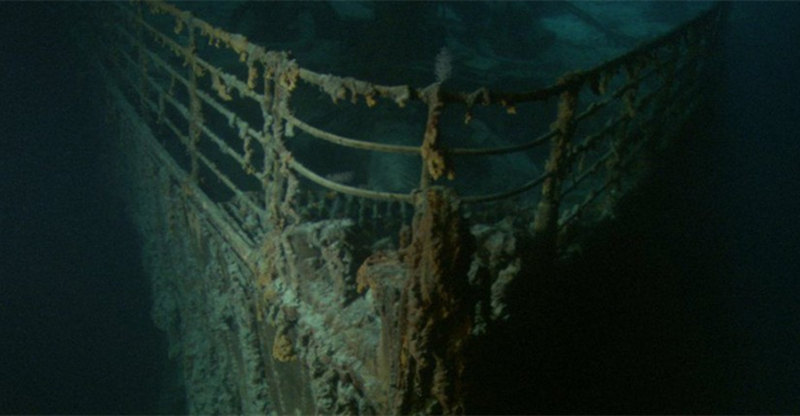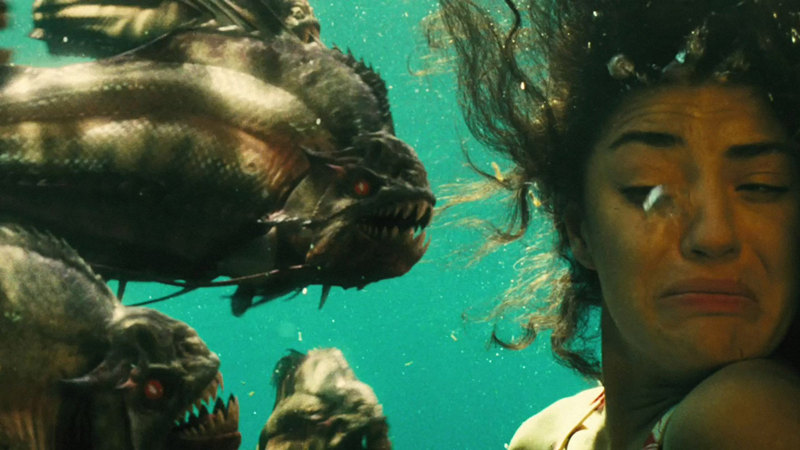My father taught American history and geography for 35 years to middle school students. We were raised to know, among other things, that history was, is and will always be extremely important. This said, why does the world seem to continually battle the same issues and make the same mistakes over and over again? Perhaps the answer is found in, of all films, “Terminator 2: Judgment Day.”
Edward Furlong (as John Connor): “We’re not goanna make it, are we? People, I mean.”
Arnold Schwarzenegger (as The Terminator): “It’s in your nature to destroy yourselves.”
With this spirit, I eagerly watched Oliver Stone’s “Untold History of the United States” on Blu-ray disc, a ten-part Showtime Original Series being distributed for the home market by Warner Bros. Spanning several decades from the World War II years to the present, we’re given a very critical analysis of modern American history through a lens that makes us simultaneously cringe and shake our heads.
My first introduction to Stone was “Platoon,” a semi-biographical film based on his experiences as an infantry man on the Vietnam War’s front lines. I gradually learned more about his passion for using film as a means to offer critical commentary on all things political, and have always appreciated the fact that he seems to make his films for himself and his messages more so than to make a profit. The often blunt, direct nature of his titles is one of the things I appreciate the most about Stone’s work. He prefers to get right to the heart of the matter rather than beat around the bush.
This same perspective is very evident throughout “Untold History of the United States.” Stone narrates the entire 796 minute feature, which moves at a most rapid pace. In fact, I’d argue that without a somewhat advanced knowledge of the time periods this documentary examines, a viewer will be left in the dust. The footage is so tightly edited and the narration so rarely interrupted by interviews with experts or quotes from those being shown on the screen. Stone packs a whole lot into what I initially thought was a ton of run time, but given the volume of information, I suppose he wound up cutting a fair amount out.
Spread over twelve chapters and four discs, “Untold History of the United States” is well laid out with archival footage and a few more modern additions. The combination and balance Stone probably worked tirelessly to achieve is excellent, and helps to ensure that the documentary is visually entertaining as well as informative.
Part 1, Chapter 1: World War II
This new one-hour series features human events that at the time went under-reported, but crucially shaped America’s unique and complex history. The first chapter explores the birth of the American Empire by focusing on Franklin D. Roosevelt, Winston Churchill and Joseph Stalin. Through examination of key decisions during World War II, audiences discover unsung heroes such as American Henry Wallace and explore the demonization of the Soviets.
Part 1, Chapter 2: Roosevelt, Truman & Wallace
Highlights from the historical upset of Harry Truman replace in Henry Wallace as Roosevelt’s Vice President during his fourth term – this dramatic shift in leadership propelled the US toward empire building. Also details the exploration of the relationship between the US and the Soviet Union and the beginnings of the Cold War. The relationships between Roosevelt, Stalin and Churchill are an integral part of postwar Europe’s division at the Yalta conference.
Part 1, Chapter 3: The Bomb
The strategies behind the US atomic bombings of Japan are explored, as well as the new mythology that emerged from the war. The bombing haunted the Soviets and mistrust toward the Allies grew quickly. The consequences of beginning a process that could end life on the planet are examined.
Part 2, Chapter 4: The Cold War
The equation changes: specific month-by-month causes of the Cold War. Highlights include Churchill’s Iron Curtain speech, the civil war in Greece and the Red Scare that prompts the rise of Joseph McCarthy, the House Un-American Activities Committee and the FBI.
Part 2, Chapter 5: The 50s: Eisenhower, the Bomb and the Third World
Eisenhower and John Foster Dulles replace Truman. Stalin dies but relations with the Soviet Union turn colder. The H-bomb and the doctrine of nuclear annihilation are explored, as are the Korean War and US rearmament. McCarthyism grows and so does the ruthlessness of US policy toward the Third World. Eisenhower emerges as a game changer.
Part 2, Chapter 6: JFK to the Brink
JFK and the Bay of Pigs; on the brink of total war during the Cuban Missile Crisis; early Vietnam; JFK’s attempts at peace with Khrushchev; JFK’s assassination.
Part 2, Chapter 7: Johnson, Nixon & Vietnam: Reversal of Fortune
Cataclysm in Vietnam as the war reaches a turning point – there’s no going back. The betrayal by Richard Nixon.
Part 3, Chapter 8: Reagan, Gorbachev & the Third World: Rise of the Right
Carter’s dreams of change give way to Ronald Reagan’s secret wars in Afghanistan and Central America. Gorbachev emerges. Fresh opportunities for peace arise. The debate over Reagan’s legacy.
Part 3, Chapter 9: Bush & Clinton: Squandered Peace and New World Order
Russia introduced to American Capitalism. US goes to war in Middle East. New World order is shaped.
Part 3, Chapter 10: Bush II & Obama
George W. Bush’s doctrine of an “endless war” against terrorism manifests in the Department of Homeland Security, in Iraq and Afghanistan and in a worldwide global Security State. The cannibalization of the US economy continues. Obama and the destiny of the American Empire.
Stone’s “Untold History of the United States” illustrates that there is another side to our past that has influenced the present. He also isn’t afraid to point fingers, name names or make it clear that he’s mighty pissed off so much of what he’s highlighting is flying under the radar. Most of us realize when we get a little older that what we learned in elementary, middle and high school wasn’t really the entire story, and the greater question, of course, is why the heck don’t we just level with ourselves and our children to be honest? Perhaps there is a good reason. I’ve yet to find it.
There are several specific things that I learned and picked up from “Untold History of the United States,” but the greater take away had to do with the parallels between our domestic and international relations in the past and present looking equally pathetic. Political leaders have consistently made decisions that result in financial distain, loss of life and massive mistrust between citizens and their elected officials. If, as David Halberstam once suggested, we are electing our best and brightest to have this authority, and this is how the act with such power, what does this say about the rest of us?
“Untold History of the United States” is unlikely to make its way into primary or secondary school curriculum. It probably won’t challenge Ken Burns for his epic stranglehold on the American history documentary marketplace. And it likely won’t take off and reach as widespread an audience as it could and should. But if you’re willing to let it in, you’ll find a few moments here and there that are sure to make you step back and reexamine your perspective. It helps if you like studying history, but I’d argue that those who don’t probably need to watch it more so than those who do.
Video:
Most of the film’s visuals are sharp looking and offer reasonable clarity with decent coloration. Stone’s archival footage leaves a little to be desired, but it’s understandable because most of it is several decades old. The transitions between older footage and newer footage are pretty good, and they don’t distract all that much from the themes and messages. We’re offered a 1080i High Definition 1.78:1 video transfer that holds its own and enhances the documentary’s overall look and feel.
Audio:
Most of “Untold History of the United States” is Stone’s narration, which is pretty clear and sharp for the ears to pick up on thanks to the English 5.1 DTS-High Definition Master Audio soundtrack. The occasional quotation or audio clip from a news broadcast comes through okay, but not in as impressive a manner as I’d anticipated. Subtitle choices include English, French and Spanish.
Extras:
The set’s fourth disc includes the following.
Prologue – Chapter A: World War I, the Russian Revolution & Woodrow Wilson: Roots of Empire…a look back at the election of 1900 and the Spanish-American War.
Prologue – Chapter B: 1920-1940: Roosevelt, Hitler, Stalin: The Battle of Ideas…FDR inherits a nation divided with conflict, and while struggle leads to change in the US, Hitler rises to power in Germany while the US and Soviet Union struggle toward an uneasy alliance.
A Conversation with History: Tariq Ali and Oliver Stone
In this companion film, Stone and author/political philosopher Tariq Ali discuss various topics in a hard-hitting, probing conversation on the politics of history.
Warner Bros. also included the nearly 750 page New York Times bestseller companion book to the documentary series, which helps to chronicle the challenges Stone and historian Peter Kuznick bring up against the prevailing orthodoxies in our nation.
A Final Word:
The great African American poet and civil rights advocate James Baldwin once wrote: “People pay for what they do, and still more for what they have allowed themselves to become, and they pay for it, very simply, by the lives they lead.” It seems that it is our job to use what’s left in our lives to find some goodness and meaning in this life.


